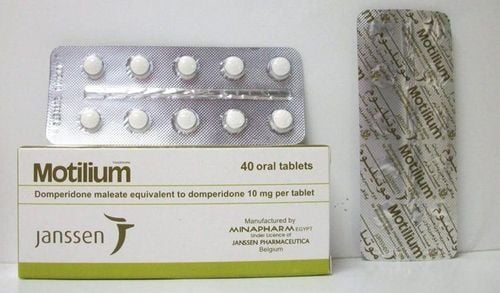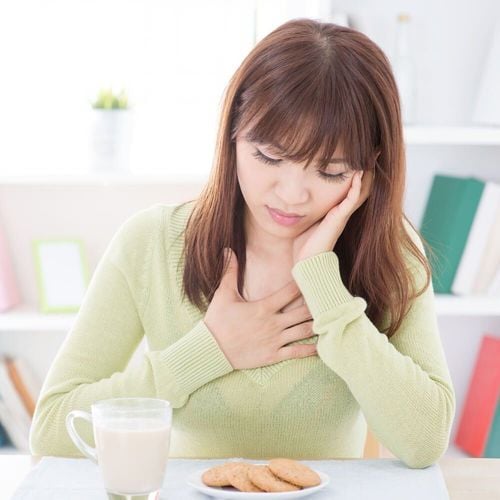This is an automatically translated article.
Article by Master, Doctor Mai Vien Phuong - Gastrointestinal endoscopist - Department of Medical Examination & Internal Medicine - Vinmec Central Park International General Hospital.
Early signs of pregnancy, stress and anxiety are among the common causes of headaches and nausea. However, in some cases, they can be a sign of a serious medical condition that requires immediate treatment. Therefore, you need to be aware of an emergency situation in order to get medical help in time.
1. Overview
Nausea is an unpleasant feeling in the stomach and the urge to vomit as well as a warning sign for vomiting contents of the stomach. Nausea often has many causes and can often be prevented.
A headache is a painful, uncomfortable condition that occurs in or around your head, including your scalp, sinuses, and neck.
Headache and nausea sometimes occur together. In some cases, they can be a sign of a serious medical condition that requires immediate treatment. So you need to be aware of an emergency situation to get medical help in time.
2. What causes headaches and nausea?
Many people often wonder "why do I have a headache and nausea". Migraines are a common cause of headaches and nausea. In addition to headaches and nausea, migraines can cause many other symptoms such as dizziness, sensitivity to light. Other conditions associated with headaches and nausea include:
Dehydration and low blood sugar. Stress or anxiety Food poisoning and allergies High blood pressure Diabetic ketoacidosis Erythema, pharyngitis Alcohol withdrawal delirium Early pregnancy is also a frequent cause of headaches and nausea Infections, such as such as common cold or flu Brain infection, skull fracture Colorado tick fever, malaria Renal arteriosclerosis Polio, Anthrax Ebola virus, severe acute respiratory syndrome, yellow fever End stage kidney disease Consuming too much caffeine, alcohol or nicotine can also cause nausea headaches 3. When should you seek medical help? In many cases, mild to moderate headaches and nausea will go away on their own over time. For example, most cases of the common cold and flu go away on their own without treatment.
In some cases, headaches and nausea are signs of a serious underlying health condition. You should seek immediate medical attention if you have a very severe headache or if your headache and nausea get worse over time.
You should also see a doctor if any of these symptoms are accompanied by headache and nausea:
Stuttering Confusion Dizziness Neck stiffness and fever Vomiting for more than 24 hours Do not urinate for 8 hours or more Loss of consciousness If you suspect you need urgent care, seek help.

4. How to treat nausea and headaches? Treatment depends on the cause of the headache and nausea. For example, sitting in the front seat of a car can reduce motion sickness. Motion sickness can also be treated with medications such as dimenhydrinate (Dramamine), an antihistamine, or by removing a scopolamine patch to relieve seasickness.
Taking medication to address the underlying cause of the nausea may also be helpful. Examples include stomach acid reducers for GERD or pain relievers for severe headaches.
Staying hydrated can help minimize dehydration once the nausea subsides. This includes taking small, frequent sips of clear liquids, such as water or drinks containing electrolytes.
As you begin to re-introduce food, it helps to follow the BRAT diet (banana, rice, apple sauce and toast) until your stomach settles down.
5. How to prevent nausea, headaches? Avoiding nausea triggers can help prevent this. Triggers include:
Flashing lights that can trigger migraines Heat and humidity Beach trips Smells of perfumes and cooking smells Take an anti-nausea medication (scopolamine) before starting a trip Distance by car or boat can also prevent motion sickness. Changing your eating habits, such as eating smaller meals, can help reduce symptoms of nausea. Avoiding intense physical activity after meals can also minimize feelings of nausea. Avoiding spicy, high-fat, or greasy foods can also help. In short, headache and nausea sometimes occur together. In some cases, they can be a sign of a serious medical condition that requires immediate treatment. So you need to be aware of a potential medical emergency in order to get medical help promptly.
Please dial HOTLINE for more information or register for an appointment HERE. Download MyVinmec app to make appointments faster and to manage your bookings easily.
Reference source:Headache FAQ. (n.d.). headaches.org/headache-faq/ Mayo Clinic Staff. (2018). Hypoglycemia. mayoclinic.org/diseases-conditions/hypoglycemia/basics/complications/con-20021103 Mayo Clinic Staff. (2018). Migraines. mayoclinic.org/diseases-conditions/migraine-headache/home/ovc-20202432 Mayo Clinic Staff. (2018). Nausea and vomiting. mayoclinic.org/symptoms/nausea/basics/definition/sym-20050736














